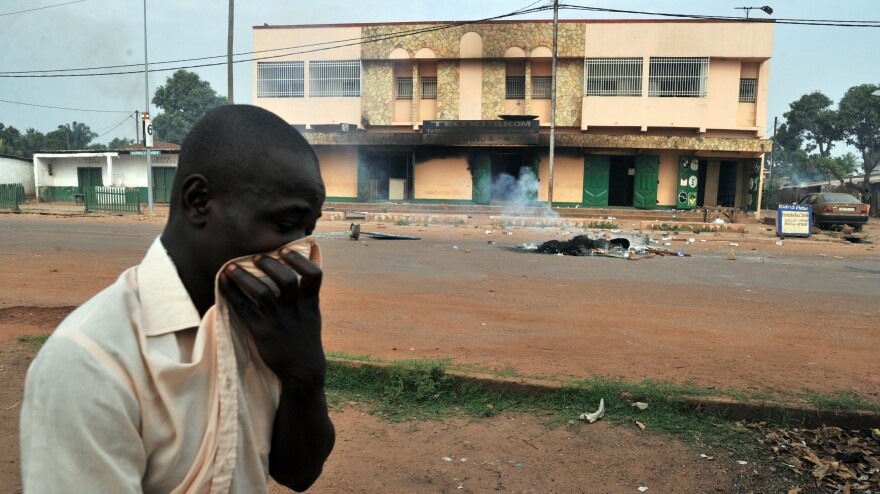Last year, Muslim militias helped overthrow the country's Christian president of the Central African Republic and marauded through Christian areas. Today, the circumstances are reversed, with Christian militias terrorizing Muslim communities and prompting a mass exodus.
French and African peacekeepers have mostly failed to stop the violence as the isolated country of 4 million continues to unravel.
Wazili Yaya, a Muslim, has witnesses the recent violence.
He has been custodian of the Ali Babalo Mosque in the capital Bangui since a wealthy merchant built it 19 years ago. Its painted arches are a testament to a Muslim community that makes up a minority of the population in this mainly Christian country — yet account for the vast majority of its traders and merchant class.
An unlocked door opens on a low white basin. This is where we prepare the corpses, he says. There were 40 this week. He pulls out his cell phone to show photos.
All the bodies show signs of violence far beyond what was needed to kill: castrations, decapitations, machete wounds to the head.
Each time he gets a body, he takes a photo of it.

Even in one of the poorest countries in Africa, the ubiquity of camera phones means the wounds live on after bodies are buried. They're texted and shared and become part of the terror driving tens of thousands of Muslims over the border to become refugees in Chad or Cameroon.
Donatella Rovera, a senior crisis adviser for Amnesty International, has been driving around the country talking to survivors.
"Those who are stating their determination to get rid of the Muslim population are making good on their threats," she says. "What we are seeing is the Muslim civilian population paying the price for the atrocities committed by the previous regime."

A Muslim Takeover
That regime, called the Seleka, came to power last March in a coup led by militias from the mostly Muslim northwest of the country.
It wasn't a religious takeover — there wasn't any talk of Islamic law — but it did feel to many Christians in the capital like their city was being overrun. The mostly Muslim fighters committed atrocities against the mostly Christian population, and many in the country accuse Muslim civilians of supporting the assault, even joining in to loot and kill and rape their Christian neighbors.
French forces arrived in December and forced the Muslim fighters to retreat. The Muslim president, who had been in power for just a matter of months, stepped down. The Muslim civilians were then exposed to a Christian majority bent on revenge. That's why in every grainy videos of Muslims being lynched, the sound of bystanders cheering is audible.
Horrific Acts
One of the most viral videos is just 19 seconds long. It shows a young man posing like a rapper and holding a burnt human leg. He mugs for the camera, brings the leg up to his mouth and bites with staged relish into the thigh.
"The cannibal," as the press referred to him, told reporters that he killed one Muslim stranger to avenge three Christian relatives. However, mob justice also has been cover for settling private grievances. Ethnic cleansing can mean getting to loot a neighbor's television, or kill a former boss.
Neither African peacekeepers nor French troops now patrolling this city have been able to stop the violence. Human rights workers say that French troops have observed lynchings without intervening.
"What we can see is inaction," says Rovera, of Amnesty International.
She says that peacekeepers were deployed last year to protect Christians from Muslims, and were caught unprepared when Muslim civilians became the main casualties.
"The greatest mistake is the failure to recognize how fast things were changing on the ground," she says.
Recently, Rovera says, there's been an awakening. On Wednesday, the French defense minister flew to the country to call for the protection of Muslim civilians as well.
But Rovera says the Christian militias are already expanding their targets, killing Christians they say are "Muslim sympathizers," which could mean simply residing in majority Muslim areas.
"Today their primary aim is to get rid of the Muslim population," Rovera says. "But what will they do next?"
And the longer these groups are running the streets, the harder it will be for international peacekeepers to dislodge them.
Copyright 2021 NPR. To see more, visit https://www.npr.org.







